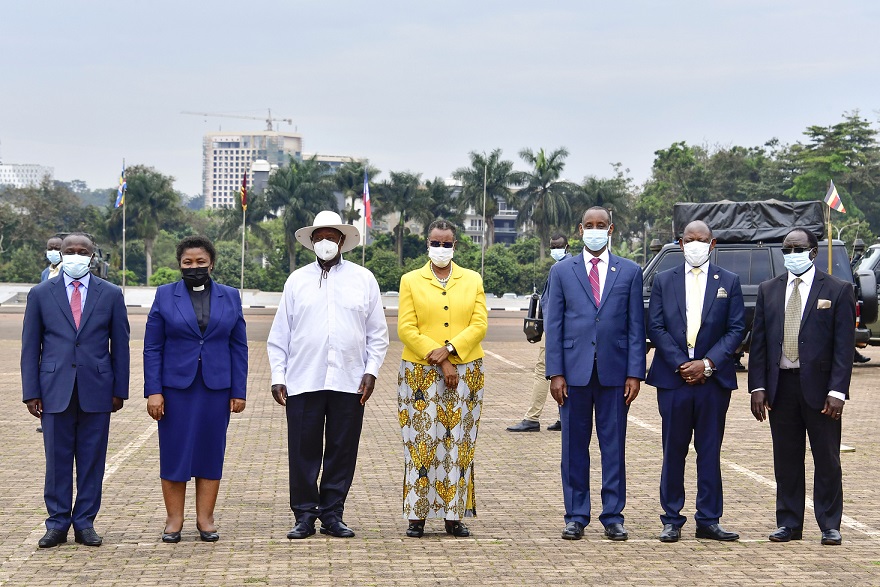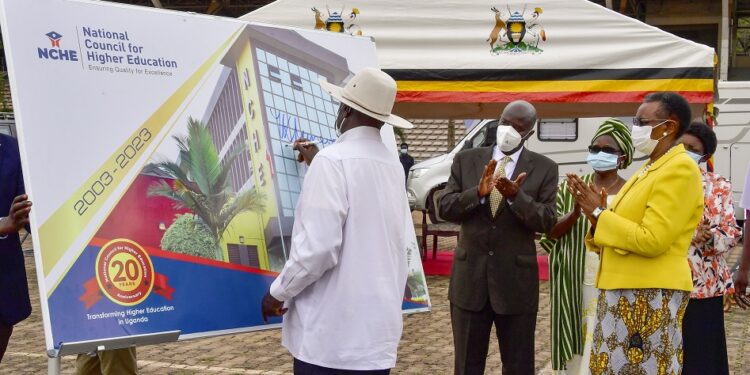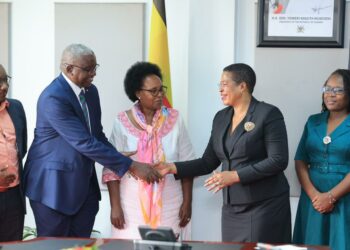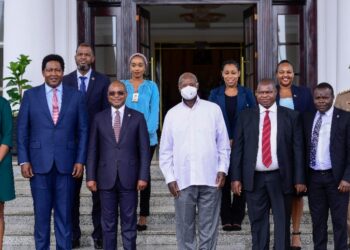President Yoweri Kaguta Museveni has appealed to the education managers in Uganda to be clear on their historical role of imparting education basics to learners and helping them understand nature and its natural laws.
This, according to the President, will help Ugandans solve problems in society.
“Modern education in my view, especially the higher one, is about two things; number one is understanding nature and understanding its natural laws. So, you should be very clear because sometimes the mystification of knowledge can confuse people who are learning from you. You should make people understand nature and its natural laws and how they can be used in solving problems or even create problems because some people use natural laws to create problems for the society,” President Museveni said.
The President made the remarks today while officiating at the 20th Anniversary celebrations of the National Council for Higher Education (NCHE) at Kololo Independence Grounds. The celebrations ran under the theme: “20 years of the National Council for Higher Education; Transforming Higher Education In Uganda”.
President Museveni informed the Education experts that they have a duty to fulfil to ensure that people stop believing in witchcraft and superstition and believe more in natural science because it is very crucial in solving societal problems.
“Natural science is everywhere; like when you put bananas in the ground to ripen, it is those bacteria that ripen those bananas, but our people think it is warmth that makes them ripe. But why do bananas get ripe even when they are on a tree? So that is the disconnection among African people and others. For instance, in the Middle Ages, people in Europe were believing in superstition but for them they have moved on but your people here are stuck in that non-science way of life and I don’t know how you are assessing that because I find this a very big problem to have a society that is still superstition oriented. On the side of social science, how are you going to handle that because this is part of enlightenment? How can you enlighten society; a society that believes in science?” he inquired, before congratulating the NCHE upon celebrating 20 years of service.

President Museveni further advised that a country like Uganda should embrace the biotechnology law so that they can use it to defend themselves against any form of misuse by bad elements.
“There’s also another danger of some people who say, in science there’s no God, no! Because here I’m talking about you understanding the natural laws but who created those natural laws? This is where I don’t agree with these universities which say in science there’s no God. You talk of gravity but who created it? But that is another issue, the atheist, the scientists and those who believe in God, we can handle. The first problem we have is having a society which is disconnected with natural science and is stuck in superstition,” the President noted.
“In my view, the challenge of education we have in a society like this, are those two. On the side of science, it is understanding that science is essentially about nature and its laws and how they can be used positively or negatively because for instance now when we are talking about biotechnology, it can be used to do good things, but it can also be used to discover a germ which can kill only Africans because of their genetic makeup and not other people. We need to adopt the biotechnology law so that we can study it in order to use it but also to defend ourselves against the misuse. It is not good to stay away from biotechnology because other people will use it both positively and negatively against us and we shall not be able to defend ourselves,” he added.
On the issue of limited human resources to promote science in government institutions, President Museveni pledged that the government will offer all the necessary support to realise the goal.
“Regarding the challenges, we are going to study them and we shall respond,” he stated.
Meanwhile the President re-echoed the need for scientists to get higher pay than other professionals in the country, saying that they are needed urgently, and it is the right time for them to work and be recognized.
“On the issue of salary, I support the scientists for the government Universities to be paid well, it is not that we are against the other professionals, but we must start with these ones because we need them now,” he added.
The First Lady and Minister of Education and Sports, Maama Janet Museveni applauded her predecessors under the National Resistance Movement (NRM) government for creatively shaping the role of regulation of Higher Education in the country.
“All these people who have come before the current generation of leaders in the Sector have played a key role in birthing and nurturing this youthful institution called NCHE,” Maama Janet said.
The Minister also noted that as they celebrate the 20 years of NCHE’s existence, they are also taking stock of the leaps that the Higher Education sub-sector has grown.
“The quantitative increase from 67 higher education institutions 20 years ago to 265 right now is a testament that the government has created an environment that fosters growth. This shows that NCHE’s work has increased four-fold to monitor and authorize many higher education institutions to operate,” she revealed.
“Your Excellency, as NCHE stands at the gate setting off for the next twenty years, it needs to position itself as a catalyst for the transformation of the higher education system in Uganda to make our country a Higher Education hub for the East African region – and it is possible. However, this possibility should not just mean the multiplication of universities in quantity alone. The essence of this multiplication should be evident in the quality and excellence of our students’ qualifications and competitiveness in the region.”
Maama Janet further disclosed that the government has endeavoured to answer the question of access to higher education by establishing more public universities and that the liberalisation of the Education Sector has also widened opportunities by allowing the private sector to further increase access to higher education through establishing institutions of learning.
“The challenge that NCHE should address is the quality of higher education being offered in these institutions, especially the science and technology programs. Therefore, NCHE must ensure that the programs and courses offered in both public and private higher education institutions do not vary in quality. All must be excellent programs and qualifications. That is when the education hub will be meaningful,” she said.
“The higher education system should become relevant to the society it is operating in by rightly diagnosing the problems in society and their root causes before prescribing remedies and interventions. This is the only way higher education becomes the driver of socio-economic change.”
Maama Janet also urged that the higher education system must be aggressive and ambitious enough in integrating ICTs in the pedagogical approaches to learning, explaining that this will impart the much-required skills and abilities in students as they go out into the world of work.
The Chairperson of NCHE, Prof. Eli Katunguka thanked the council team for the job well done over the years, saying that they have shown that they are a formidable team.
Prof. Katunguka also thanked the NRM government under the wise leadership of President Museveni that developed policies to allow many players to come into provision of higher education services.
He said this has seen an increase in the public and private tertiary institutions and universities.
“Because of this marked expansion, we believe that new modalities of regulating these institutions need to come in place for efficient and effective regulation,” Prof. Katunguka asserted.
“Your Excellency, as council we are very grateful to the government through the Minister of Education and Sports for the continued financial support and guidance to the council and management of NCHE,” he added.
On the other hand, Prof. Katunguka commended President Museveni for his consistent message to them to focus on science and technology in higher education institutions.
“The Higher Education science and technology project which was running from 2015 to 2020 laid a solid foundation by renovating many workshops and laboratories and providing state of the art scientific equipment for all public universities.”

The NCHE Executive Director, Prof. Mary J. N. Okwakol disclosed that the council was established under the Universities and other Tertiary Institutions Act 2001 as amended in 2003 and 2006 and this Act mandated the council to regulate and guide the establishment and management of higher education institutions as well as equate qualifications and advise government on higher education matters.
She also highlighted some of the key achievements the council has been able to achieve in the last 20 years including the establishment of the secretariat, increase in the staff numbers, getting a permanent home after 13 years of renting, among others.
“We have been able to develop a quality assurance framework for universities and other tertiary institutions to guide and monitor the performance of the institutions, but institutions also use them for self-assessment which has helped to improve the quality of education in higher institutions.”
The event was also attended by ministers, Members of Parliament, Education sector stakeholders, among others.
Do you have a story in your community or an opinion to share with us: Email us at editorial@watchdoguganda.com













